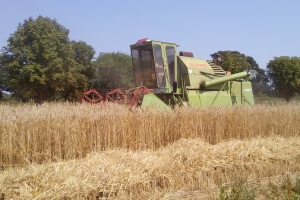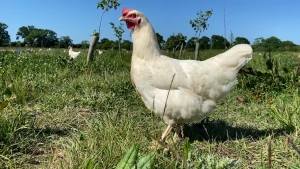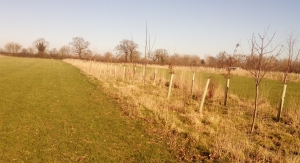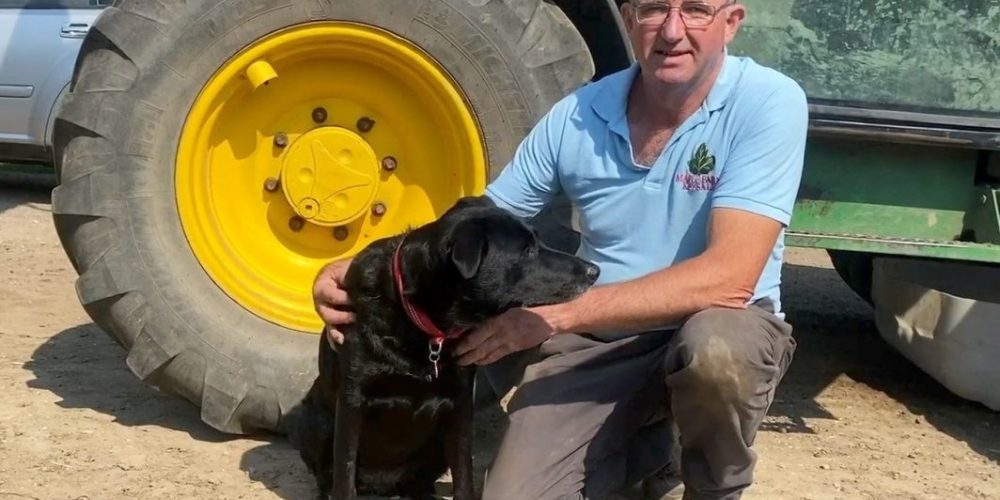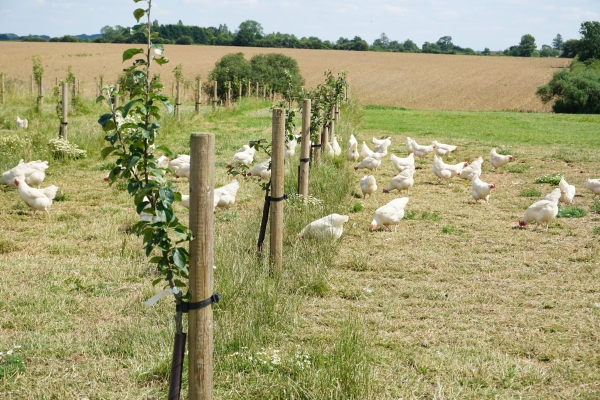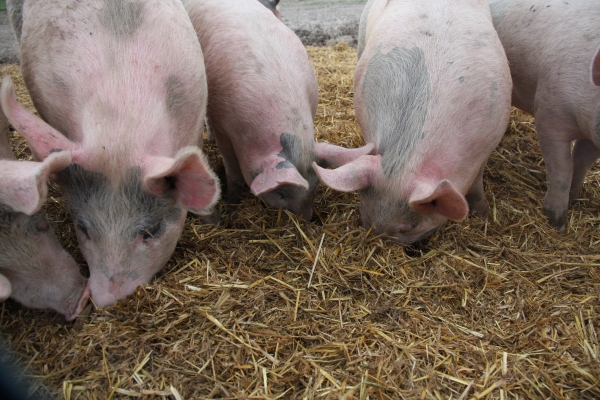Mike Mallett
Maple Farm Kelsale, Saxmundham, Suffolk
|
Listen here |
Mike Mallett is farm manager of Maple Farm Kelsale, a 138-hectare family farm situated 3 miles from the Suffolk coast. The farm converted to organic in 2004 and is mostly arable with some permanent pasture, large areas of woodland, some vegetables and fruit, and laying hens. Arable crops grown include wheat (including heritage varieties), beans, spring triticale and peas, and there are two years of clover or vetch-based leys within the rotation. Meadows are grazed by visiting sheep. Most of the cropping revolves around the layer hens which live on 18 hectares of 3 fields (there are approximately 2,700 hens currently). The farm is comprised of many small fields surrounded by hedges. Hedgerows are left to grow quite wild and have 6m borders. 30 ponds enhance the farm biodiversity and provide an extensive ditch network. There is a flour mill on site (where the heritage wheat goes) and the bran and middlings produced go to the hens as feed. The horticultural unit produces year-round vegetables and fruit for their on-site farm shop. Flour and eggs are also sold through the shop, and the eggs are also sold through local Waitrose and Co-op stores. Half of the egg production going to London; supplying a home delivery service and various independent stores.
- Mike talks about embracing the principles of regenerative agriculture through practices such as minimum tillage, direct drilling, keeping as much of the ground covered as possible, growing a diversity of crops, incorporating grazing livestock, and reducing inputs. Fertility is added via green manures or poultry manure.
- He talks about the importance of having the “right plant for the job” in relation to nutrient scavenging, outgunning weeds, and the quality of grain produced.
- He emphasises the benefits of “learning to live” with weeds, embracing how they can be used to benefit the soil and wildlife -“wildlife needs to have that underbelly of plants” – and talks about weed management through crop selection and rotation.
- He describes some of the mixed cropping deployed on the farm; winter beans are combined with rye, spring triticale with peas, cereal crops are undersown with a legume mix, and there is now 100 acres of agroforestry. From 2014 / 2015 they started implementing an agroforestry scheme; native trees are interspersed with fruit trees and there are fields with biomass cropping i.e. hazel and poplar, poplar and wild cherries, a traditional orchard, a nut plantation… Mike describes how the alleyways of trees are used by the hens within the closed loop system. At just over 200 birds a hectare, it is very low density, which has positive impacts on their behaviour, welfare and mortality rates.
- He talks about the importance of breed selection in relation to the hen’s foraging habits, explaining what the birds enjoy foraging and how he manages the grass.
- He gives some insights into various breeds of hen, describing his experience of their natures, tolerance to weather and foraging habits, and explaining that his favourite breed at the moment is Black Rock – Rhode Island Red / Barred Plymouth Rock hen cross…
- His involvement with hens led him to be part of the Horizon 2020 EU-funded OK-Net Ecofeed project which focuses on achieving the goal of 100% use of organic and regional feed. Mike is driven by a desire to eliminate bought-in protein and have a soya free ration – he describes why and how he is trying to achieve this; making his own feed and devising a careful feed programme.
- He gives some insights into how the cycle of producing cheap protein to feed monogastric animals has arisen and is perpetuated, referring to the history of breeding birds.
“Monogastrics do need a supplemental diet – which makes it hard to be truly sustainable – but there ARE ways to do it.”
- He explains the challenge in producing a year-round supply of eggs. “It’s finding a balance between stepping off the protein treadmill and maintaining enough supply of product that makes a business that’s worthwhile.” Mike has been looking at alternative protein crops as part of this; lupins, sunflowers, and vetch, which is now a fundamental part of the rotation having many virtues which he describes. He explains that as well as including vetch in leys, he is keen to use the seed – and is experimenting with manipulating seeds to lose the toxins / antinutritional factors in a way that’s on-farm compatible.
- Mike talks about the relationship between breed of hen and protein requirements, the importance of making sure they get enough nutrients, and the significance of methionine in their diets – he strives for 260 eggs a year per hen on about a 16.5% protein feed.
- He talks about his plans for the future in relation to supplying 100% local sourced on-farm protein; describing the sprouting grains system he is trialling (which now involves using a drum sprouter) and mentions his new breed of livestock – mealworms! He plans to include them in the hen’s diet as a substitute to soya and explains some of the considerations and benefits in relation to using them – which includes using the frass produced as food for the horticultural crops.
|
FARMER TIPS
|
- Find out more about the OK-Net Ecofeed project and explore some related content here.
- View a Woodland Trust case study focusing on the agroforestry at Maple Farm ‘Maple Farm – a three pronged approach to agroforestry’ here.
- Watch Mike talking at the 2021 ORFC Global conference about his aims to produce eggs from a soya free diet and describing his sprouting seeds trial, and introducing the farm and sharing fascinating practical insights based on his experience of weed management in a session run as part of the 2020 ORFC in the two videos below…
Header image and photos in slide show courtesy of Mike Mallett unless otherwise stated. All Rights Reserved.
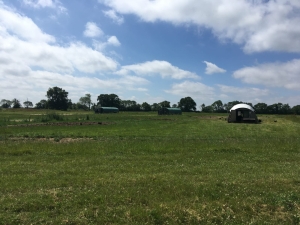
Courtesy of Charlotte Bickler
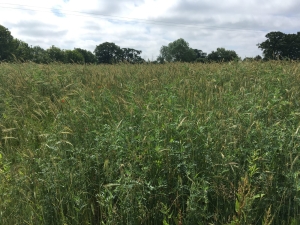
Rye and vetch - courtesy of Charlotte Bickler
